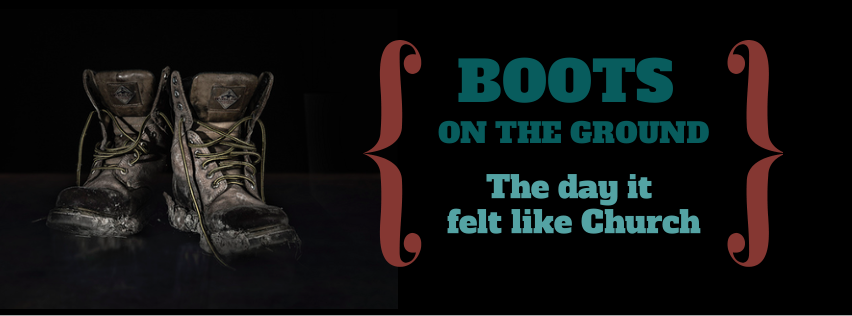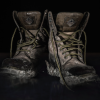Check out the Boots on the Ground Facebook page to see all the different posts in this series.

The night it felt like Church to me happened in the Summer of 2002. I was a sophomore in college and I had given my summer to working with Dry Bones: Denver, a newly launched ministry to the homeless youth that congregate to panhandle and roughhouse on Denver’s 16th Street Mall.
My reasons for being there weren’t completely altruistic, evangelistic or justice driven. That was a part of it, but the main reason I wanted to be there was because it seemed pretty cool.

My eagerness to participate in the new and strange ministry makes a little more sense if you know about the mishmash of sectarian Christianity and left-of-center politics that had formed me.
I grew up in Denver (i.e., where marijuana would eventually be legalized), a blue dot in a red state. My family was intellectual in a PBS sort of way. Our politics were more influenced by labor unions and the Civil Rights movement than anything happening up the road at Focus on the Family. However, I was also brought up in a conservative church tradition that had spread out of the Bible Belt and taken it’s southern manners with it.
In 2001, this led me to a little Christian Liberal Arts University in a dry county, 50 miles from the nearest landmark in Arkansas. Needless to say, my punk rock liberty spikes haircut were not warmly greeted.
In the land of big hair and big church buildings, I found myself wondering how any of what I was surrounded by was connected to Jesus. When I was home visiting my folks in Denver. I met up with a guy whose goatee turned into a 10 inch long beard. He told me about swapping stories for cigarettes with teenagers who slept on the streets. He told me that he thought “the brethren” should have something to say to those kids. Immediately, I knew I wanted to be one of those “brethren.”
That summer I, along with about a dozen other interns and volunteers, spent 4-6 hours a day sitting around with the gutterpunks. The beard defined our approach this way:
“Never offer a homeless person a sandwich. Sit down and ask them to share half of your sandwich.”
Over that summer, I got to know a 14 year old who had pulled her overdosed mom out of a full bathtub and called 911. She had decided it was safer to live on the streets. One day, I watched a guy brand an anarchy symbol into his arm using a paper clip and a lighter.
One night, I was witness to a funeral procession.
Two friends had been sitting on the street drinking. They got into an argument. One friend stabbed the other in the heart. The wounded man died on the spot.
A few nights later, dozens of street kids lined up holding candles, walked in a single file line, and through their tears occasionally shouted the punk rock cry “oi! oi!” Our team stood there along in silent observance. We had no right to join the procession, but our faith gave us the responsibility to observe it.
One kid, a pot-smoking, philosophizing skateboarder with a warm bed in the suburbs rolled up next to me and said. “This is really f*%ked up man. What do you believe in a world where sh*t like this happens?”
With a lifetime of churchy language restrictions suddenly seeming useless I looked away and agreed “Yeah man. Pretty f#%ked up.”
That night felt more like church than anything else I had ever experienced.
That summer on the streets, and that night in particular was a clarion moment that created my paradigm for what “feels” like “Church.” It’s important to note that I say “feels like,” because it was only a beginning.
Dry Bones wrecked me for an average church experience and I’ve been trying to rediscover what I learned that summer ever since. It provided a framework of three incarnational concepts that has defined “church” for me ever since.
1. Share your sandwich.
The beard’s lesson to “share your sandwich” is provides a definitive difference between Church and charity. There were lots of places that the gutterpunks could find food. There were not a lot of places where they could be greeted as friends and listened to without an agenda.
By sharing your sandwich you are immediately elevating someone to equal status, and wanting nothing in return. What has surprised me since (although it should not have) is the extent to which this should be applied across races and classes.
Everyone wants to feel accepted and included. Sharing your sandwich allows you to do that without an agenda.
2. Presence is everything.
Perhaps the key to the Christian faith isn’t Easter, it’s Christmas. Jesus-followers are those who believe that the eternal unknowable divine logos became a flesh and blood baby who lived in certain time and place.
Presence was the key to everything our ministry did. We spent more time together as a team and with those we were hoping to reach than any ministry I’ve seen before or since. The staff there has now been doing it now for over a decade.
Eventually, some kids decide they want help getting off the streets. Many eventually came to faith in Jesus. Change only came after being present for a very long time.
Perhaps the reason it felt like Church wasn’t because we were doing things right. Perhaps it was just because we were there. Because we were there, we were a witness that these invisible people had stories, hopes, pains, dreams and worth. Because we had been their witnesses, we had the right to share with them our own witness to the saving power of Jesus Christ.
3. Good things hurt, too.
Deep experiences with the poor leave marks on anyone who participates in them. Many leave with a broader vision of what God is doing in the world. Other leave with a new found ability to see those in need all around them.
Some leave confused, because there aren’t very many expressions of Church that can have room for what they experienced in the world. When I returned to my little Bible Belt college and tried to share my experience, many were confused and some were even offended.
Part of the reason I wanted to spend the summer with the homeless because I had something to prove. I wanted to prove to those who controlled my narrow little world that there was more to the gospel than their outdated codes of conduct.
That summer killed punk rock for me. I hoped to prove some point to the gatekeepers and institutions that would make me accept them and my spiky hair. By the time it was over I was loosing interest in those institutions, because I couldn’t imagine them ever making space for people I had met.
That summer also sent me on a mission to find something that “felt like Church.” I’m convinced that the words of Jesus were meant to be taken seriously. My daydreams are about a group of people that get together and try to do what he said.
Doing that doesn’t mean we’ll sit outside all day with the homeless, although I hope that some days we will. It does mean we’ll share sandwiches, experience presence and work through good and bad pain.
Who knows? Maybe we’ll be able to inspire punk-rockers and institutional gatekeepers along the way.
You can donate to the incomparable good stuff going on at Dry Bones here.
Other Synchroblog Posts include:
- Tyler Tully—The Day that Felt Like Church
- Ty Grigg—It Starts With Us Lamenting
- Robert Anthony Martin—Laundry
- Sarah Dinka—(re)defining: church
- Kevin Bell—House of the Peaceful Heart
- Daniel M. Rose—The Day it Felt Like Church










 Tweets
Tweets